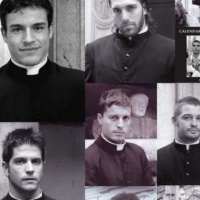Tag Archives: suffering
Questions
Some questions…..
Why do doctors and lawyers call what they do practice?
Why is abbreviation such a long word?
Why is it that when you’re driving and looking for an address, you turn down the volume on your radio?
Why is a boxing ring square?
What was the best thing before sliced bread?
How did a fool and his money get together in the first place?
There are indeed a lot of things in this life that we just really don’t understand.
But let me take it to a deeper and more disturbing level. For example, we don’t really understand disease. Why is a youngster perfectly healthy for 13 years of his life… and then suddenly just happens to be in a place where he suddenly encounters some germ or bacteria that invades his body and destroys it? This happens in meningitis cases.
And we don’t understand accidents. They are so random and indiscriminate. You start out a day that is like any other day… and then something happens in a matter of seconds… and life is forever different. You can never go back beyond that accident.
On and on we could go with our list… of things we don’t really understand.
Why is there so much pain in our world? Why do good people suffer? Why do we hurt one another? Why can’t people get along? And why do some of the best prayers seem to go unanswered?
Now, all of these difficult questions prompt us to raise yet another crucial question: What can we count on from God? When we face the troubles of the world, the heartaches of life, the tough challenges of this existence… what can we count on from God?
Christ tells a parable – a rather strange parable. It involves two people: an unjust arrogant judge and a humble but persistent woman. The judge ignores her at first, but finally grants her justice because she is so persistent. She won’t give up and she won’t go away… so eventually he gives in and comes through for her.
Now that’s the parable. Jesus then makes his point and he frames it in the form of a question.
He says, if an unjust judge gives this woman justice how much more will God bring about justice for his chosen ones?
A loving God hears our struggles, hears our cries of help and then responds to them.
WE CAN COUNT ON GOD TO BE WITH US WHEN WE ARE HURTING.
A tragedy left the man homeless, widowed and fatherless. Fire had swept through his house, and all was lost. It took some time for the full weigh of the loss to descend, and when it did, he was nearly crushed.
Like Job in the O.T. he would not be comforted…When the gift of shock was lifted, anger, resentment filled every waking thought.
God had not been fair to him God had not protected his family. He had not come to him with a special visitation to explain the “why” and the “what next”.The greatest temptation was to add to his losses by forfeiting his faith.
He felt justified. No one would fault him. Some might even support him. He prayed angrily now, daring god to hurt him further, challenging him if you like.
He prayed angrily, but he prayed, and God could handle it….The anguish continued to mount until one afternoon he uttered a cry so forcefully, it could only be described as a scream. No word was spoken, just a loud angry scream against the forces of heaven and hell, as if to say, “I’ve hurt all I can, and I’ve paid my dues for love…. Help me.”….
The silence that followed was quieter than silence. A peace was evident for the first time in months.
He believed, at last, that God was caring for those he lost. That God was caring for Him. that God could handle his honest anger, his honest emotions
And God can handle all our pent up emotions, feelings, denials. He is with us in our hurt and our pain.
And, although our questions may not be answered, we can come to know him as the one who always listens, always cares.
Wounds
God is with us in our joys and celebrations. He is also with us in our sorrows and suffering, and at our death.
There’s an old Jewish legend:
A Rabbi asked Elijah, “When will the Messiah come?” Elijah replied, “Go and ask him yourself.”
“Where is he?”
“Sitting at the gates of the city.”
“How shall I know him?”
“He is sitting among the poor covered with wounds. The others unbind all their wounds at the same time and then bind them up again. But he unbinds one at a time and binds it up again, saying to himself, ‘Perhaps I shall be needed: if so I must always be ready so as not to delay for a moment. “
The Messiah, the story tells us, is sitting among those in need, binding his own wounds but in such a way that he is always ready to help others when needed. This is the way of the Christian, the follower of Christ. We are all called to be wounded healers. We are not immune to suffering but as we look after our own wounds, we have to be prepared to heal the wounds of others.
Another way of putting it is the way that Jesus put it to his disciples. “If anyone wants to come with me, he must forget himself, take up his cross, and follow me.”
Fear
Fear is the path to the dark side.
Fear leads to anger.
Anger leads to hate.
Hate leads to suffering.
– Yoda
When Things Go Wrong
The Meenister’s Log
The wonderful Tom Gordon (formerly chaplain to the Marie Curie Hospice in Edinburgh) tells this story:
A female patient who was dying was visited by her daughter on a regular basis, but there was no sign of the lady’s husband.
It was explained that he had a drink problem.
Tom wrote to him, saying that he would visit on a certain day at a certain time.
He turned up at the door of the man’s house, with a feeling of trepidation, was was greeted with a stone-cold sober gentleman, shaved and well-dressed.
“Come in” he said “the kettle’s boiling – into the kitchen for a cuppa”
On the fridge was Tom’s letter attached by a magnet.
On it, after giving the time and date of the visit, Tom had written “You’re a good man, X” and this was underlined in red ink.
On asking why he had done this, the chap said “Because nobody has ever called me that”
–ooOOoo–
I was once called out during the night to see a patient who was refusing all pain control because he wanted to die in agony.
His reasoning was that,he had to atone for unspecified “sins” that he had committed in his younger years.
I sat beside him for several hours and said something along the lines of “think of the good things that you’ve done – sometimes unawares – but have helped others making their life better, happier, more loving”
To borrow Tom’s phrase “You’re a good man, remember that”
He died in my arms
–00OO00–
Someone said that grief is ordinarily characterised by intense mental suffering and distress, deep sorrow and painful regret.
There was a super intelligent, witty, well read lady whom I once came across – but she never smiled. Way back when, unmarried, she had two abortions, following impregnation by a married man. It had been 30 years before, but the burden of guilt still lay heavily upon her – she thought that her health-problems were a result of this.
So sad – it puts our rather feeble problems into context
Filed under The Ramblings of a Reformed Ecclesiastic







